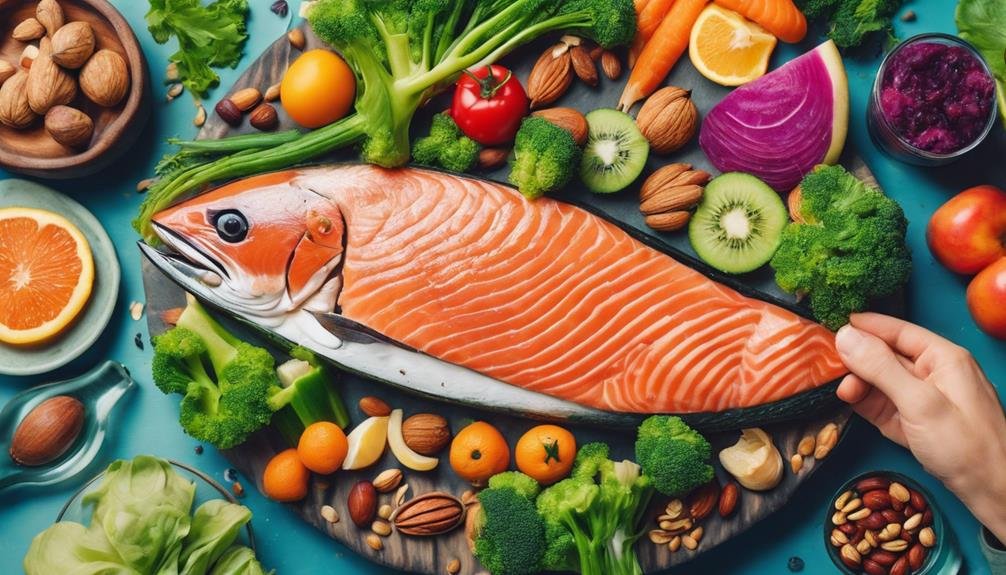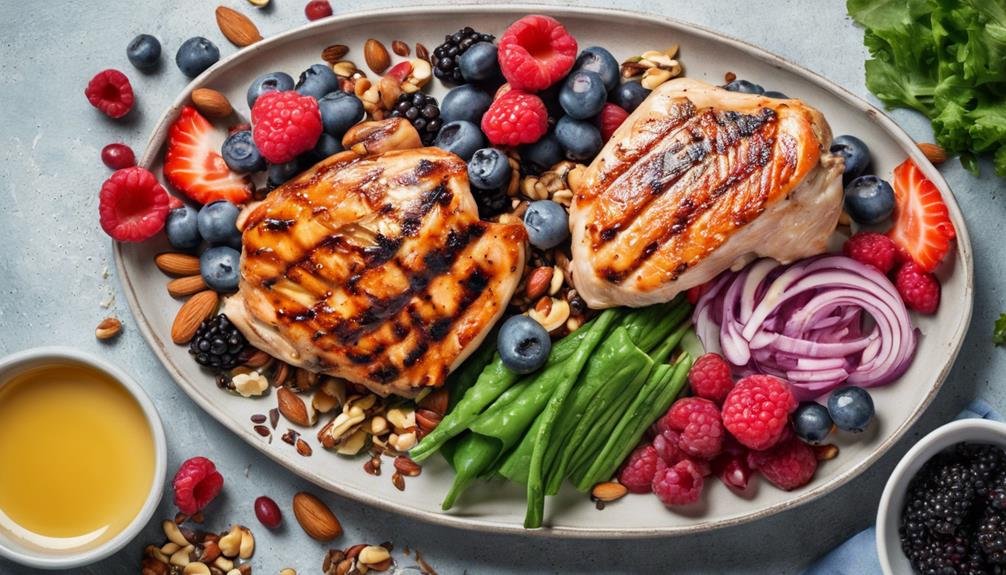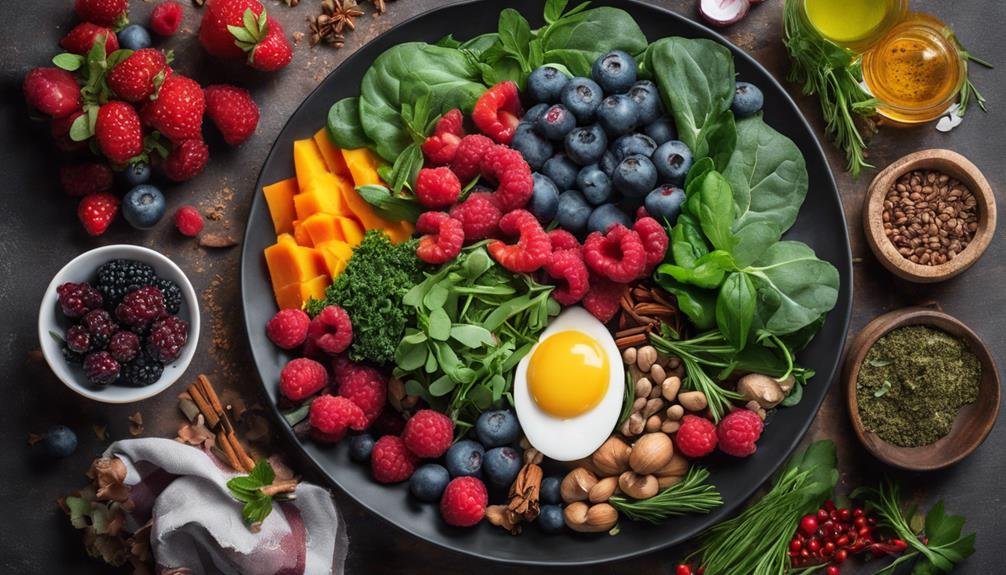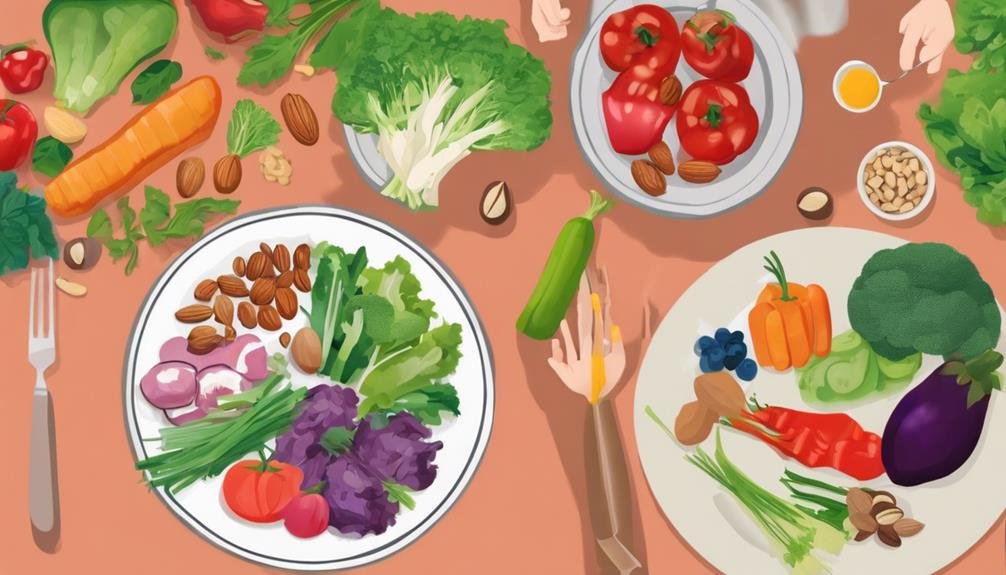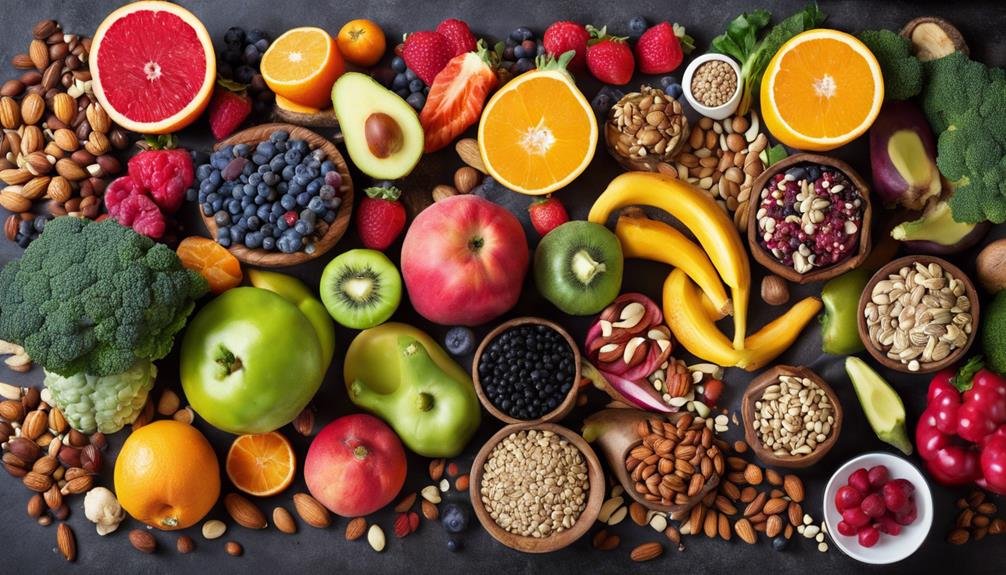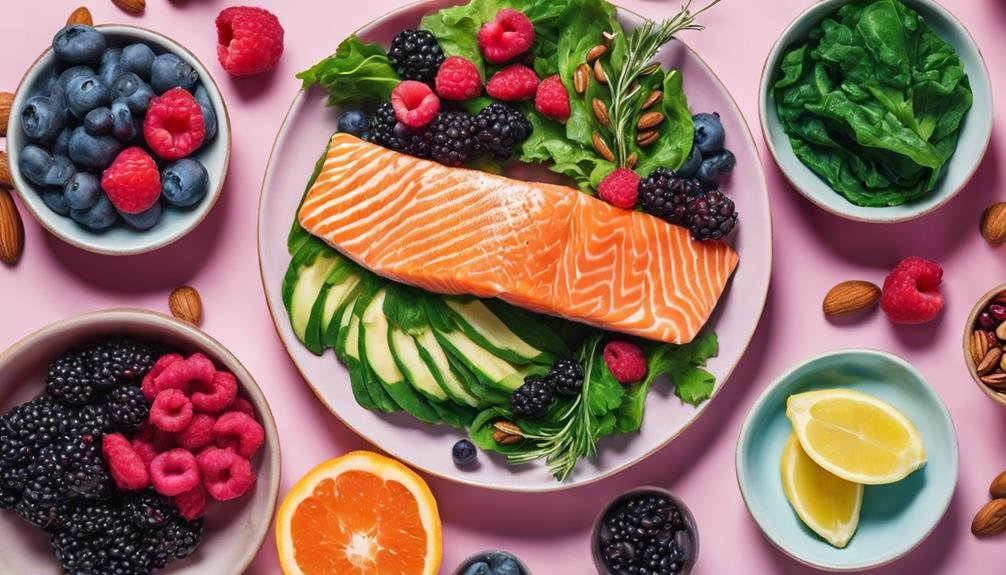Did you know that the Paleo diet's focus on whole, unprocessed foods may hold a key to reducing cancer risks? By exploring the intricate relationship between this ancestral eating pattern and its potential impact on cancer prevention, you might uncover surprising connections that shed light on the power of food choices in influencing your health outcomes. The intricate dance between diet and cancer development unveils a fascinating narrative that could transform the way you view your daily food selections and their potential long-term effects on your well-being.
Paleo Diet Overview
The Paleo diet, short for Paleolithic diet, is a dietary approach that emphasizes consuming foods that our ancestors would have eaten during the Paleolithic era.
This diet typically includes lean meats, fish, fruits, vegetables, nuts, and seeds while excluding grains, legumes, dairy products, processed foods, and sugars.
The rationale behind the Paleo diet is rooted in evolutionary biology, suggesting that our bodies are better adapted to the types of foods available during the Paleolithic era, which lasted from about 2.5 million to 10,000 years ago.
Cancer Development Process
During the development of cancer, normal cells in the body undergo genetic mutations that disrupt their normal growth and division processes. These mutations can be caused by various factors, including exposure to carcinogens, genetic predisposition, and lifestyle choices. When these mutations occur, they can lead to the uncontrolled growth and spread of abnormal cells, forming tumors and interfering with the body's normal functions.
The cancer development process is a complex series of events that involve the interaction of multiple genes and signaling pathways. These genetic alterations can allow cells to evade mechanisms that usually regulate their growth, leading to the formation of tumors. Additionally, cancer cells can acquire the ability to invade surrounding tissues and metastasize to distant organs.
Understanding the cancer development process is crucial for developing effective prevention and treatment strategies. By identifying the underlying mechanisms that drive cancer progression, researchers can target specific pathways to inhibit tumor growth and improve patient outcomes.
Through continued research and education, we can work towards reducing the burden of cancer on individuals and society.
Impact of Diet on Cancer
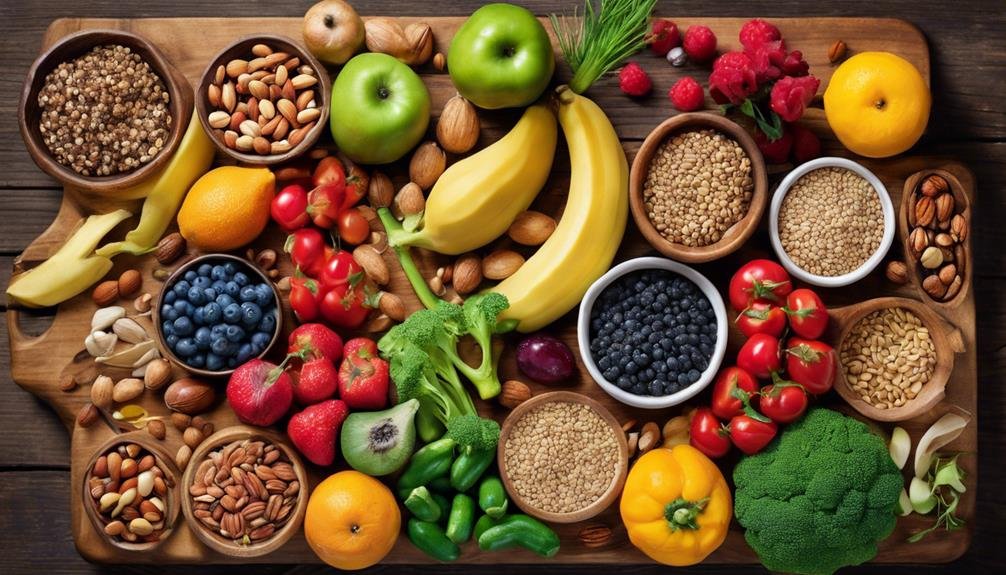
A balanced and nutritious diet plays a crucial role in influencing an individual's risk of developing cancer. Consuming a variety of fruits, vegetables, whole grains, lean proteins, and healthy fats provides essential nutrients and antioxidants that help protect cells from damage that can lead to cancer.
On the other hand, diets high in processed foods, sugars, unhealthy fats, and red or processed meats have been linked to an increased risk of various types of cancer. For instance, excessive consumption of processed meats like bacon or hot dogs has been associated with a higher risk of colorectal cancer.
Additionally, diets lacking in fiber from fruits, vegetables, and whole grains may increase the risk of developing digestive system cancers. Therefore, making conscious choices to include a diverse range of nutrient-rich foods in your diet can significantly impact your cancer risk and overall health. Remember, small changes in your eating habits can have a big impact on reducing your risk of cancer.
Inflammation and Cancer
Moving from the impact of diet on cancer risk, it's crucial to explore the connection between inflammation and cancer development. Inflammation is a natural immune response to harmful stimuli, such as pathogens or damaged cells. However, chronic inflammation can lead to DNA damage, cell mutations, and an environment favorable for cancer growth.
Research suggests that sustained inflammation plays a significant role in the development of various types of cancer, including colorectal, lung, and breast cancer. Inflammatory markers like C-reactive protein (CRP) have been associated with an increased risk of cancer and poorer outcomes in cancer patients.
The Paleo diet, rich in anti-inflammatory foods such as fruits, vegetables, nuts, and seeds, may help reduce chronic inflammation in the body. By consuming a diet that supports lower levels of inflammation, you may potentially decrease your risk of developing cancer and improve your overall health.
It's important to consult with a healthcare provider to discuss how dietary changes, like adopting a Paleo diet, can best support your health goals and reduce cancer risks.
Antioxidants and Cancer Prevention
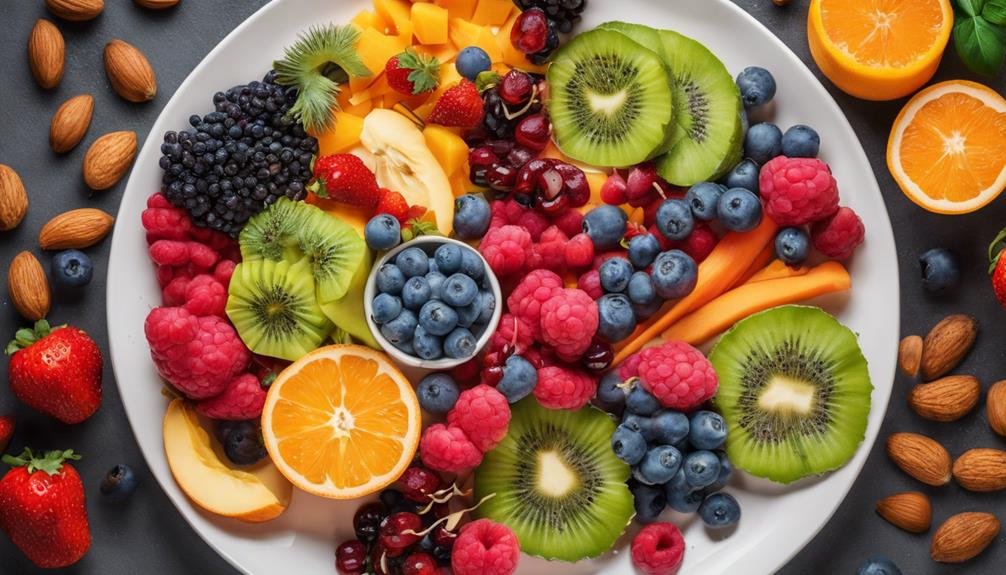
To understand the role of antioxidants in cancer prevention, it's essential to delve into their impact on cellular health and the body's defense against oxidative stress. Antioxidants are crucial molecules that help neutralize harmful free radicals in the body, which can otherwise damage cells and contribute to the development of cancer. By scavenging these free radicals, antioxidants protect cellular structures such as DNA from mutations that may lead to cancer initiation and progression.
Research suggests that a diet rich in antioxidants, such as the Paleo diet, can help reduce cancer risks by bolstering the body's natural defense mechanisms. Foods like fruits, vegetables, nuts, and seeds that are staples of the Paleo diet are abundant sources of antioxidants like vitamins C and E, beta-carotene, and selenium. These antioxidants help to maintain cellular integrity, support the immune system, and reduce inflammation – all of which are critical components in cancer prevention.
Therefore, incorporating antioxidant-rich foods into your diet can be a proactive step in reducing your cancer risk and promoting overall health.
Glycemic Control and Tumor Growth
Exploring the correlation between glycemic control and tumor growth reveals a significant interplay between dietary factors and cancer progression. Maintaining stable blood sugar levels is crucial in managing tumor growth, as high-glycemic diets can lead to increased insulin levels, which in turn may promote cancer cell proliferation. Research suggests that diets high in refined carbohydrates and sugars can elevate blood glucose levels, creating an environment conducive to tumor development and progression.
In contrast, the Paleo diet, rich in whole foods like lean proteins, fruits, vegetables, nuts, and seeds, promotes better glycemic control by reducing the intake of processed sugars and refined carbohydrates. By stabilizing blood sugar levels, this dietary approach may help in inhibiting tumor growth and reducing cancer risks. Adopting a Paleo diet can potentially modulate insulin responses, limit glucose availability to cancer cells, and create a less favorable environment for tumor progression.
Considering the impact of glycemic control on tumor growth underscores the importance of dietary choices in cancer prevention and management. By prioritizing whole, nutrient-dense foods and minimizing high-glycemic options, individuals can potentially exert a positive influence on their health outcomes.
Gut Microbiome Influence
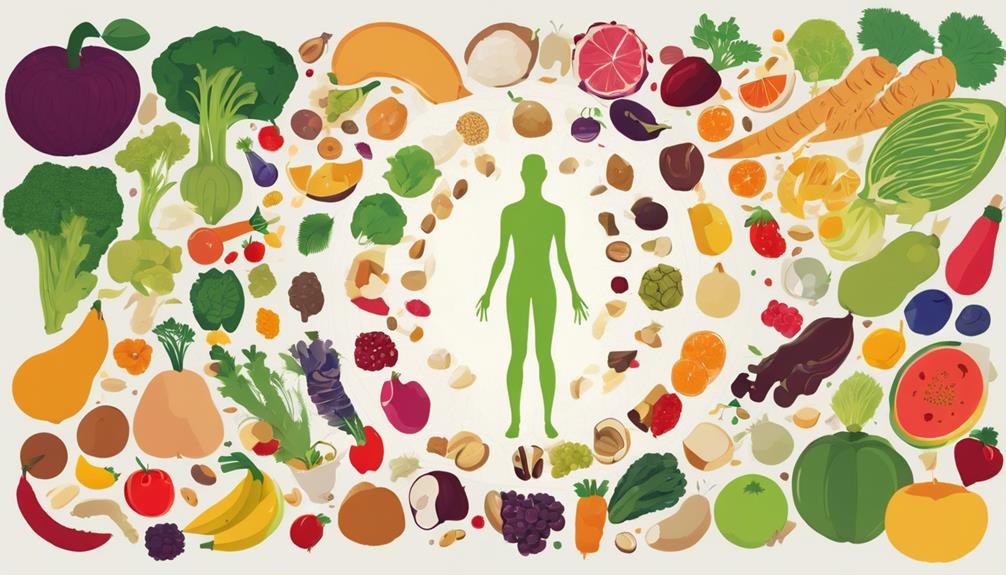
The interconnection between dietary factors and cancer progression extends beyond glycemic control to encompass the intricate realm of the gut microbiome. Your gut microbiome, a complex community of bacteria, fungi, and other microorganisms residing in your digestive tract, plays a crucial role in maintaining overall health. Research suggests that the composition and diversity of your gut microbiome can influence inflammation, immune function, and even cancer development.
Studies have shown that a diet rich in plant-based foods, like the Paleo diet, can promote a diverse and beneficial gut microbiome. By consuming a variety of fruits, vegetables, nuts, and seeds, you provide your gut with essential nutrients that support the growth of beneficial bacteria. These good bacteria help regulate inflammation, strengthen the immune system, and potentially reduce the risk of cancer.
Therefore, by following a Paleo diet that emphasizes whole, nutrient-dense foods, you can positively impact your gut microbiome and potentially reduce your risk of cancer.
Role of Nutrient Density
Nutrient density plays a pivotal role in the Paleo diet's potential impact on reducing cancer risks. The Paleo diet emphasizes whole, nutrient-dense foods such as lean proteins, fruits, vegetables, nuts, and seeds. These foods are rich in essential vitamins, minerals, antioxidants, and phytochemicals that support overall health and may help reduce the risk of cancer development.
A diet high in processed foods and low in essential nutrients can contribute to inflammation, oxidative stress, and cellular damage, which are all factors associated with cancer development.
In contrast, the Paleo diet's focus on nutrient-dense foods provides the body with the necessary tools to combat oxidative stress, reduce inflammation, and support optimal cellular function, potentially reducing the risk of cancer.
Reducing Carcinogenic Exposures

To further enhance the potential benefits of the Paleo diet in reducing cancer risks, attention must be directed towards minimizing carcinogenic exposures. Carcinogens are substances that can promote cancer development, and reducing your exposure to these harmful compounds is crucial in cancer prevention.
Here are some practical steps you can take to decrease your contact with carcinogens:
- Choose organic produce: Organic fruits and vegetables are grown without synthetic pesticides and chemicals that may contain carcinogens.
- Limit processed meats: Processed meats have been linked to an increased risk of certain cancers due to additives and preservatives used in processing.
- Avoid charred or smoked foods: Cooking meats at high temperatures can create carcinogenic compounds, so try to cook them at lower temperatures or use gentler cooking methods.
- Filter your drinking water: Some water sources may contain contaminants that are known carcinogens, so using a water filter can reduce your exposure.
- Use natural cleaning products: Many conventional cleaning products contain chemicals that may be carcinogenic, so opt for natural alternatives to reduce exposure in your home.
Hormonal Balance and Cancer
How does hormonal balance influence the development and progression of cancer? Hormones play a crucial role in regulating various physiological processes within the body, including cell growth and division. When hormonal balance is disrupted, it can lead to an increased risk of cancer development.
For example, high levels of estrogen have been linked to an elevated risk of breast and uterine cancers, while high levels of testosterone have been associated with an increased risk of prostate cancer.
Furthermore, certain hormones can stimulate the growth of cancer cells, promoting tumor progression and metastasis. Insulin-like growth factor (IGF), for instance, has been shown to enhance the growth of many types of cancer cells.
Additionally, hormonal imbalances can impact the body's immune response to cancer cells, potentially making it more difficult for the immune system to identify and destroy abnormal cells.
Maintaining hormonal balance through dietary and lifestyle choices, such as following a Paleo diet rich in whole foods and engaging in regular physical activity, may help reduce the risk of cancer by supporting optimal hormone levels and minimizing potential disruptions that could contribute to cancer development.
Lifestyle Factors and Risk Reduction
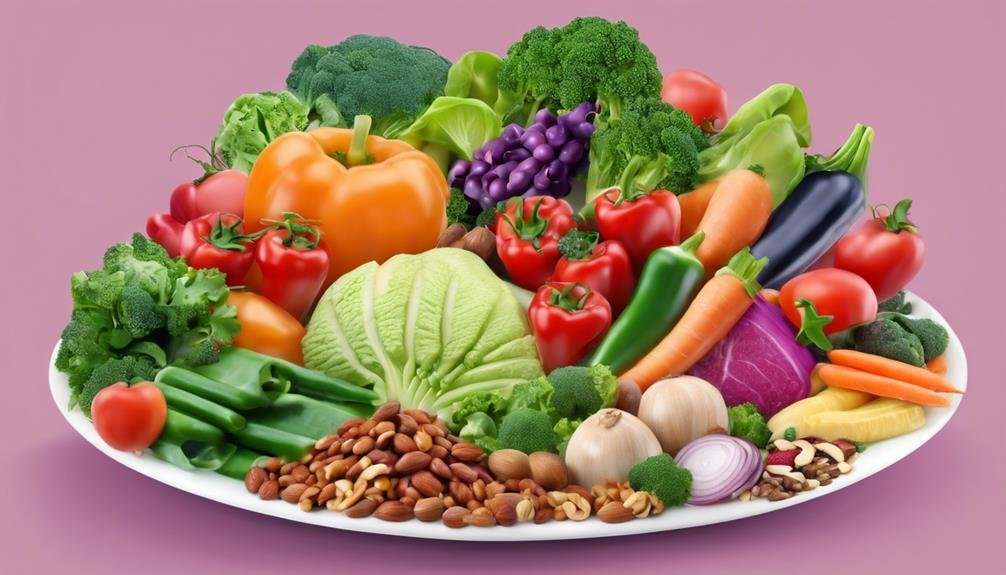
Maintaining a healthy lifestyle plays a significant role in reducing the risk of cancer development and progression. Lifestyle factors can greatly influence your overall health and well-being. Here are five key aspects to consider:
- Diet: Consuming a balanced diet rich in fruits, vegetables, lean proteins, and whole grains can provide essential nutrients that support your body's defenses against cancer.
- Physical Activity: Regular exercise not only helps in maintaining a healthy weight but also boosts your immune system, reducing the risk of cancer.
- Avoiding Tobacco: Smoking is linked to various types of cancer. By quitting smoking or avoiding tobacco products, you can significantly lower your cancer risk.
- Limiting Alcohol: Excessive alcohol consumption has been associated with an increased risk of developing certain cancers. Moderation is key to reducing this risk.
- Sun Protection: Protecting your skin from harmful UV rays by using sunscreen, wearing protective clothing, and seeking shade can lower the risk of skin cancer.
Practical Tips for a Paleo Lifestyle
A key aspect of adopting a Paleo lifestyle involves focusing on consuming whole, unprocessed foods that reflect the dietary patterns of our ancestors. When transitioning to a Paleo diet, prioritize lean proteins like grass-fed meats, wild-caught fish, and free-range poultry. These protein sources are rich in essential nutrients and healthy fats.
Incorporate a variety of colorful fruits and vegetables to ensure a broad spectrum of vitamins, minerals, and antioxidants. Opt for organic produce when possible to minimize exposure to pesticides and chemicals.
Include healthy fats from sources like avocados, nuts, seeds, and olive oil to support brain function and overall health. Replace refined sugars with natural sweeteners like honey or maple syrup in moderation.
Stay hydrated by drinking plenty of water throughout the day. Finally, remember to listen to your body's hunger and fullness cues to maintain a balanced and sustainable Paleo lifestyle. By following these practical tips, you can successfully embrace a Paleo diet and potentially reduce your cancer risk.
Frequently Asked Questions
Can the Paleo Diet Cure Cancer?
The paleo diet isn't a cure for cancer. While some studies suggest it may reduce certain cancer risks due to its focus on whole foods and avoidance of processed items, there's no definitive evidence to support it as a standalone treatment.
Cancer treatment requires a comprehensive approach involving medical professionals, personalized treatments, and lifestyle changes. It's essential to consult with healthcare providers for evidence-based cancer care.
Are All Types of Cancer Affected by Diet?
Absolutely, diet can influence various types of cancer. Studies show that certain dietary patterns, like the Mediterranean diet rich in fruits, vegetables, and whole grains, may reduce the risk of developing certain cancers.
For instance, colorectal cancer risk can be lowered by consuming high-fiber foods. Remember, while diet plays a role, individual factors also contribute to cancer risk.
Maintaining a balanced, nutrient-rich diet can positively impact your overall health and potentially reduce cancer risks.
Can Paleo Diet Prevent Cancer Recurrence?
To address cancer recurrence, the Paleo diet, rich in whole foods and low in processed items, may be beneficial. This diet emphasizes lean proteins, fruits, vegetables, nuts, and seeds, potentially supporting overall health and reducing inflammation.
While more research is needed to confirm a direct link, following a Paleo diet could contribute to a lifestyle that supports cancer prevention and reduces the risk of recurrence.
Is It Safe to Follow a Strict Paleo Diet?
Following a strict paleo diet can be safe for short-term use, but long-term adherence may pose risks due to potential nutrient deficiencies.
It's important to ensure you're getting a balanced intake of essential nutrients like fiber, calcium, and vitamin D.
Consulting with a healthcare provider or a registered dietitian can help you tailor the paleo diet to meet your individual nutritional needs and reduce any potential health risks.
Can Paleo Diet Benefit Cancer Patients Undergoing Treatment?
Following a strict paleo diet while undergoing cancer treatment may have potential benefits. The diet's emphasis on whole foods, lean proteins, and healthy fats can support overall health and provide essential nutrients. However, it's crucial to consult with your healthcare provider or a registered dietitian before making any significant dietary changes. They can help tailor a nutrition plan that best suits your individual needs during cancer treatment.
Conclusion
As you journey towards a healthier lifestyle with the Paleo diet, remember that each meal is a shield against the dangers of cancer. Just as ancient warriors armed themselves with strong defenses, your food choices can fortify your body against harmful invaders. Embrace the power of nature's bounty to protect your cells and promote longevity. Stay vigilant, stay nourished, and let your plate be your armor in the battle for optimal health.
